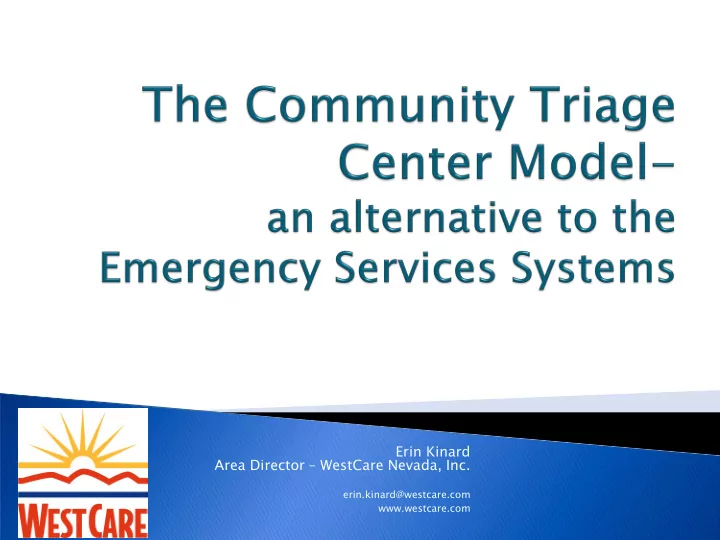

Erin Kinard Area Director – WestCare Nevada, Inc. erin.kinard@westcare.com www.westcare.com
Passed in 1986 the Emergency Treatment and Active Labor Act (EMTALA), requires all CMS-participating hospitals to provide emergency care to all individuals seeking care irrespective of ability to pay. According to the Centers for Medicare and Medicaid Services (CMS), amounts to 55% of emergency care is uncompensated. (A.Adalja, M.D) Across the nation the Mentally-ill and/or Intoxicated individuals creating over-crowding, long wait times and impacting care in the Emergency Rooms. 2
Adults with chronic mental-illness and/or intoxication exist in every community and are the “highest system users” costing the community millions of dollars. Those in the Emergency Rooms, Law Enforcement, Emergency Medical Services, Ambulance, Paramedics, Jail, Court rooms, Mental Health hospitals, etc. 3
These individuals cycling through the systems of care, cost the community tremendous amounts including time and money. Most times individuals cycle through these systems of care, several times a week, a month or sometimes even in a day. What can be done to stop the cycle and wasting money? 4
In 2002, the Southern Nevada Regional Planning Coalition (SNRPC) recognized a report that a significant number of chronic inebriated and mentally ill persons were being held in emergency rooms for long periods of time due to an insufficient availability of mental health beds and other alternative detoxification facilities. In 2003, the SNRPC agreed to create a centrally located Community Triage Center (CTC) of 50 beds for those mentally ill persons and chronic inebriates who are not in need of emergency room care. WestCare agreed to operate the CTC through their facility. For the past twelve years, this center has been funded by the State of Nevada, local governments and area hospitals. 5
As an alternative to the Emergency Rooms, this is a mid-level of care for those with: ◦ Intoxication/Substance Abuse ◦ Mental Illness Assessments for inpatient & outpatient services Initial case management services Referrals & service linkages Safe & effective treatment options for early intervention Discharge planning Clients served are often homeless, uninsured, under-insured & indigent 6
The CTC’s are positioned to care for those who present with mental health and/or substance abuse issues as well as non-acute* medical conditions. As an alternative level of care, they are equipped to handle the non-violent behavioral health and intoxicated clients in the community. *Non-acute is defined based on medical status of the individual and the type of intervention indicated. 7
For those being removed from a public situation without formal charges, the Civil Protective Custody detainees, for example are taken to the CTC in lieu of the ‘drunk tank’ in jail. Engagement in substance abuse or mental health treatment is also a potential outcome for this program. Case Management and discharge planning are the keys to initiating change in this population. 8
Of this population seen in the ER, studies of the CTC populations in Nevada have shown 97% have no acute medical issues, only behavioral health problems. They are held in the ER for assessments, medical clearance and due to the lack of available psychiatric beds in the community. If released, there are concerns about liability, so ER’s are caught in the bind between discharging with no plan and opening-up beds for the medically-acute. 9
Staffing includes Registered Nurses, Nurse Practitioners, Case Managers, Counselors, a Medical Director and on-call Psychiatrists with the ability to accept patients 24-hours per day/ 7 days per week. Medications are provided for those in need of stabilizing chronic but exacerbated medical conditions and for any medical issues during detoxification. Low-level medical procedures can be performed, however CTC’s are not intended for that purpose. 10
With the Community Triage Center Several levels of intervention approach, there is one intermediate level of care where all issues can be can occur with this one addressed LAW person. ENFORCEMENT EMERGENCY CTC ROOM PERSON IN CRISIS MENTAL EMERGENCY HEALTH RESPONDERS COMMUNITY PROVIDERS 11
AVERAGE COST PER ENCOUNTER: Ambulance: $1,267.00 Hospital: $1,500.00 ($500.00/day x 3.5 days) First Responders: $1,000.00/incident Per encounter estimate: $3, $3,767. 767.00 00 12
Las Vegas CTC admissions: 4,056 Average length of stay: 3.5 days Recidivism rate: 15% Total costs: $1,726,480.67/year 13
If the same 4,056 clients had one encounter each with Emergency Services at $3,767.00, there would be $15 15,278 278,952. 2.00 00 in costs to the community versus $1,726,480.67 for the same clients at the CTC! Total Sa Savings: $1 $13, 3,552 52,472.00 14
Erin Kinard MS, NCC, LCADC, WestCare Nevada Email: erin.kinard@westcare.com Website: www.westcare.com 15
Universal Health Insurance Mandates, And The Em ergency Care Myth by Amesh Adalja, M.D retrieved August 12, 2013 from: http:/ / www.forbes.com/ sites/ realspin/ 2012/ 10/ 08/ universal-health- insurance-mandates-and-the-emergency-care-myth/ 16
Recommend
More recommend